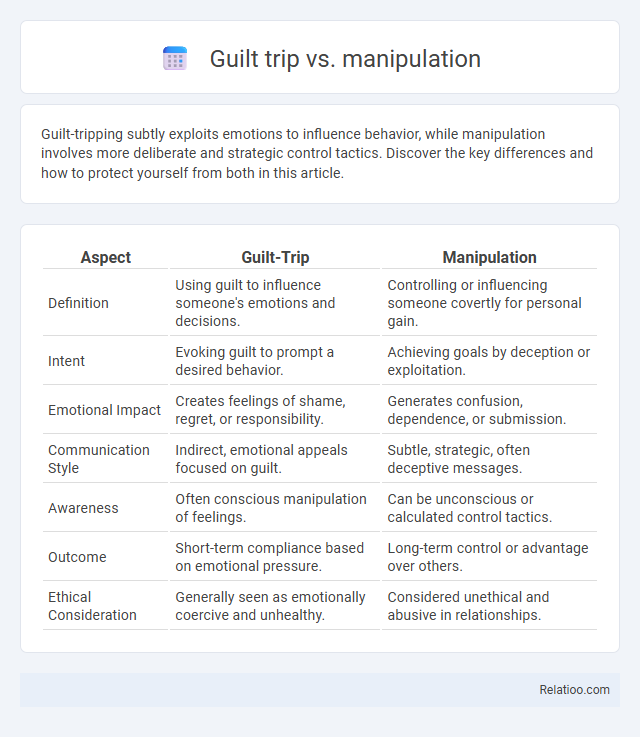Guilt-tripping subtly exploits emotions to influence behavior, while manipulation involves more deliberate and strategic control tactics. Discover the key differences and how to protect yourself from both in this article.
Table of Comparison
| Aspect | Guilt-Trip | Manipulation |
|---|---|---|
| Definition | Using guilt to influence someone's emotions and decisions. | Controlling or influencing someone covertly for personal gain. |
| Intent | Evoking guilt to prompt a desired behavior. | Achieving goals by deception or exploitation. |
| Emotional Impact | Creates feelings of shame, regret, or responsibility. | Generates confusion, dependence, or submission. |
| Communication Style | Indirect, emotional appeals focused on guilt. | Subtle, strategic, often deceptive messages. |
| Awareness | Often conscious manipulation of feelings. | Can be unconscious or calculated control tactics. |
| Outcome | Short-term compliance based on emotional pressure. | Long-term control or advantage over others. |
| Ethical Consideration | Generally seen as emotionally coercive and unhealthy. | Considered unethical and abusive in relationships. |
Understanding Guilt-Trip and Manipulation
Guilt-trip and manipulation both involve influencing others' emotions, but a guilt-trip specifically leverages feelings of guilt to control behavior, often by emphasizing perceived personal responsibility or moral failure. Manipulation is a broader psychological strategy that can use various tactics, including guilt-trips, to deceive, coerce, or exploit someone for the manipulator's benefit. Understanding guilt-trips involves recognizing how emotional pressure exploits empathy and conscience, while manipulation encompasses intentional, deceptive control across emotional, cognitive, or behavioral dimensions.
Key Differences Between Guilt-Trip and Manipulation
Guilt-trip involves making someone feel responsible or remorseful to influence their behavior, while manipulation encompasses a broader range of deceptive tactics to control or exploit others. Guilt-tripping primarily targets emotions related to guilt and conscience, whereas manipulation can include lying, withholding information, or playing on fears and desires. Understanding these distinctions helps identify when emotional influence crosses into unethical control.
Psychological Tactics in Guilt-Tripping
Guilt-tripping is a psychological tactic that exploits feelings of remorse to influence your behavior, often leading to compliance without direct confrontation. Unlike manipulation, which can involve a range of deceptive strategies to control or exploit, guilt-tripping specifically targets your conscience to induce emotional pressure. Recognizing these tactics helps you maintain emotional boundaries and respond assertively to protect your mental health.
Common Manipulation Strategies Explained
Common manipulation strategies include guilt-tripping, which involves making You feel responsible or ashamed to influence behavior, and emotional manipulation that exploits vulnerabilities for control. Both tactics overlap as forms of psychological manipulation but differ in execution--guilt-tripping focuses on inducing remorse, while broader manipulation may use deception, fear, or flattery. Recognizing these strategies helps in identifying unhealthy interactions and maintaining emotional autonomy.
Signs You’re Being Guilt-Tripped
Signs you're being guilt-tripped include feeling an overwhelming sense of responsibility for someone else's emotions, experiencing persistent reminders of past mistakes, and noticing subtle or overt statements designed to make you feel selfish or ungrateful. Unlike general manipulation, guilt-tripping specifically targets your conscience to evoke shame or remorse, often through phrases like "After all I've done for you" or "If you cared, you would." Recognizing these tactics can help distinguish guilt-tripping from broader manipulation strategies, allowing you to set healthier emotional boundaries.
Recognizing Manipulative Behavior
Recognizing manipulative behavior involves identifying tactics like guilt-tripping and emotional manipulation designed to control or influence another person's actions. Guilt-tripping exploits feelings of remorse to induce compliance, whereas manipulation often employs a broader range of psychological strategies, including deceit, gaslighting, and coercion. Understanding these distinctions enables individuals to set healthy boundaries and reject attempts to undermine their autonomy.
Emotional Impact of Guilt-Tripping vs Manipulation
Guilt-tripping primarily exploits feelings of remorse and responsibility to control behavior, creating a pervasive sense of emotional burden that can erode self-esteem over time. Manipulation, while sometimes involving guilt, broadly targets multiple emotional vulnerabilities to influence decisions, often masking true intentions and leading to confusion and mistrust. The emotional impact of guilt-tripping is more direct and immediate, inducing anxiety and self-doubt, whereas manipulation causes long-term psychological distress through deception and power imbalance.
Why People Resort to Guilt-Trip or Manipulation
People resort to guilt-trips and manipulation as psychological tactics to control or influence others' behavior by exploiting emotions like remorse and obligation. Guilt-tripping leverages a person's sense of responsibility or empathy to induce compliance, often stemming from fear of rejection or desire for approval. Manipulation involves more strategic and covert actions aimed at gaining power or advantage, frequently driven by insecurity or a need to dominate interpersonal dynamics.
How to Defend Against Guilt-Tripping and Manipulation
Defending against guilt-tripping and manipulation requires recognizing emotional tactics that aim to control your behavior by making you feel responsible for others' feelings or outcomes. Setting clear boundaries and assertively communicating your feelings and limits can reduce the impact of these manipulative strategies on your mental well-being. Empowering your decision-making with self-awareness and seeking support from trusted individuals reinforces your ability to maintain control over your responses to guilt and manipulation.
Building Healthy Boundaries in Relationships
Guilt-trip involves inducing feelings of guilt to influence behavior, while manipulation uses more covert tactics to control or exploit others. Both can undermine trust and emotional safety, making it essential to establish clear, assertive boundaries to protect one's mental well-being. Building healthy boundaries empowers individuals to communicate expectations, recognize toxic patterns, and maintain balance in relationships.

Infographic: Guilt-trip vs Manipulation
 relatioo.com
relatioo.com